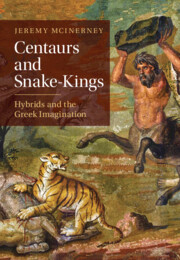Book contents
- Frontmatter
- Dedication
- Contents
- List of Figures
- Preface
- Acknowledgments
- Spelling and Orthography
- 1 Introduction: Encountering the Sphinx
- 2 ‘Welcome to Athens’: Theories of Hybridity
- 3 Hybrids around the Corrupting Sea
- 4 Hybrids, Contact Zones and Margins
- 5 Heads or Tails: Gorgons, Satyrs and Other Composites
- 6 Centaurs and Other Horses
- 7 Snakes and the Perils of Autochthony
- 8 Hermaphrodites and Other Bodies
- 9 Adynata, Ethnography and Paradox
- 10 Conclusions
- Bibliography
- Index
9 - Adynata, Ethnography and Paradox
Published online by Cambridge University Press: aN Invalid Date NaN
- Frontmatter
- Dedication
- Contents
- List of Figures
- Preface
- Acknowledgments
- Spelling and Orthography
- 1 Introduction: Encountering the Sphinx
- 2 ‘Welcome to Athens’: Theories of Hybridity
- 3 Hybrids around the Corrupting Sea
- 4 Hybrids, Contact Zones and Margins
- 5 Heads or Tails: Gorgons, Satyrs and Other Composites
- 6 Centaurs and Other Horses
- 7 Snakes and the Perils of Autochthony
- 8 Hermaphrodites and Other Bodies
- 9 Adynata, Ethnography and Paradox
- 10 Conclusions
- Bibliography
- Index
Summary
Hybrids were integral to the classificatory schemes that organized knowledge in the wake of Alexander’s conquests. Texts produced by Hanno, Ktesias and Megasthenes reveal the slippage whereby ethnographic description created hierarchies of territories and cultures exemplified by hybrid animals and exotic humans. In literary texts India played an especially significant role. It was a mirror image of the Mediterranean, yet far enough away to also generate anomalous wonders on its borders. It was not merely the exotic animals of distant lands, such as camels, leopards, and giraffes, that astonished the Greek subjects of Hellenistic kings, but also the descriptions of anomalous humans, such as Blemmyes, Dog-Heads and Skiapods, that confirmed an orderly Mediterranean world of properly recognizable humanity, the edges of which were populated by the monstrous, the ugly and the deformed. Ethnography and paradoxography were therefore highly conservative genres that provided hierarchies structured on normality and anomaly to reinforce order.
Keywords
- Type
- Chapter
- Information
- Centaurs and Snake-KingsHybrids and the Greek Imagination, pp. 260 - 290Publisher: Cambridge University PressPrint publication year: 2024



